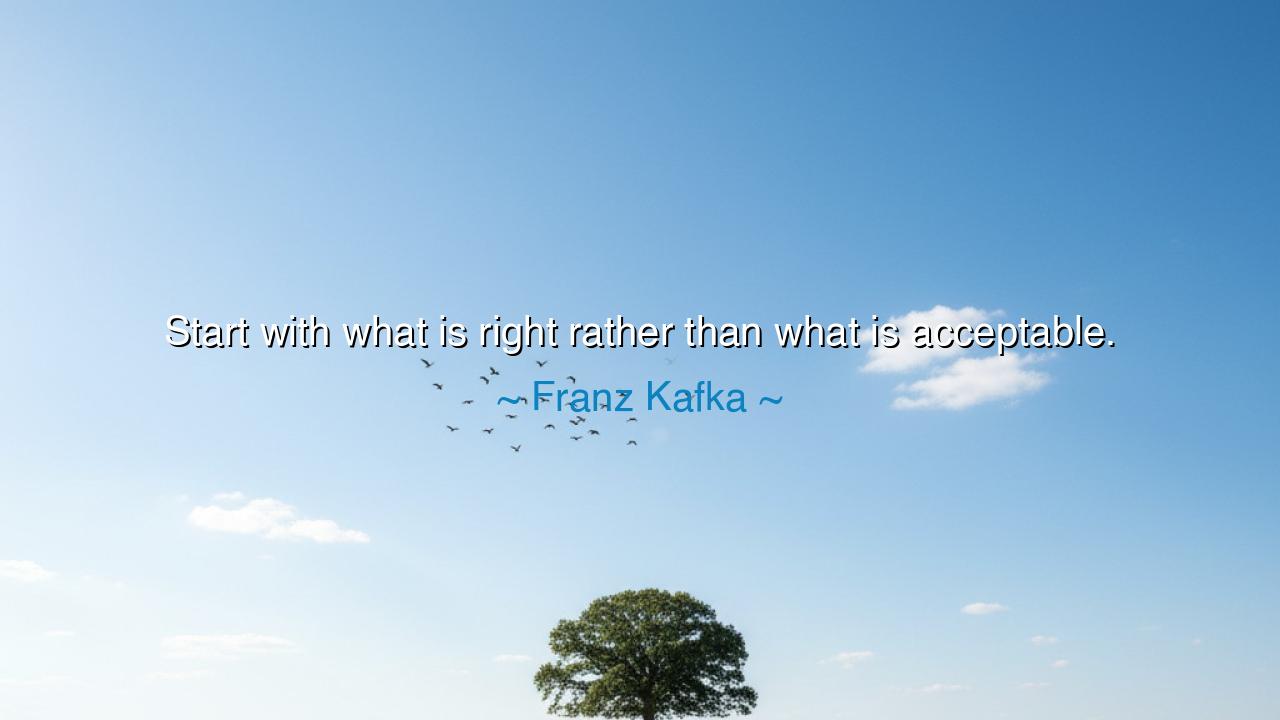
Start with what is right rather than what is acceptable.






O hear these words, passed down through the ages, for Franz Kafka speaks with a voice not of the world as it is, but of the world as it could be, were we to live with the purity of the heart. He says, "Start with what is right rather than what is acceptable." These words, simple yet profound, remind us that truth and virtue lie not in what is easy or popular, but in what is just and righteous, even if it stands in opposition to the accepted norms of the day.
In our mortal lives, we are often called to choose between the right and the acceptable. The right is the path of integrity, the uncompromising pursuit of justice, while the acceptable is that which is easy, the road most traveled by those who seek the comfort of conformity. But what is acceptable to the masses is not always the path of the righteous. History is rife with tales of those who followed the acceptable and lost their way, bound by the chains of convention, their voices silenced by the tides of time. Yet those who followed what was right, though they may have faced scorn and suffering, are the ones whose names echo through eternity.
Consider the story of the great philosopher Socrates, who chose to follow the path of what is right rather than what was acceptable in the eyes of his fellow Athenians. He stood alone in his belief in the power of knowledge, questioning the very foundations of the world that others held sacred. His refusal to abandon his principles, even when faced with death, serves as a shining example of the courage needed to start with what is right, not with what is convenient or popular. Socrates did not choose the acceptable path of appeasing the masses; instead, he chose the path of truth, and in doing so, he became immortal.
So, O children of the future, take heed of Kafka’s wisdom: do not seek what is easy, but seek what is true. The world will always try to pull you towards what is acceptable, to bow to the opinions of the many, to choose the comfort of agreement over the heat of conviction. But the true path, the path of honor and integrity, is found in the quiet courage to do what is right—even when it is the harder road, even when it costs you the love of others or the safety of conformity.
It is in this pursuit of what is right that we truly find the greatness of the soul. Look to the lives of those who stood firm, who did not waver in the face of opposition—whether in the deeds of Gandhi, who fought for freedom and justice in the face of empire, or in the example of Rosa Parks, who refused to yield to injustice, thus changing the course of a nation. These are the ones who started with what is right, and by doing so, they changed the very fabric of their societies.
And so, dear ones, take this wisdom into your lives. When the world calls you to conform, to follow the path of acceptability, remember: true greatness lies in the strength to stand for what is right, no matter the cost.






NDNgoc Diep
This quote strikes me because it speaks to integrity, but also to the complexities of decision-making. What if the 'right' thing to do is not always immediately clear? In some situations, people may view something as right, while others might see it differently. How do we navigate those gray areas? Is there a universal definition of what’s right, or does it depend on context? I’d be curious to hear how others interpret the concept of ‘right’ in real life.
MAMinh anh
I find myself reflecting on how often we settle for what's acceptable instead of what's right, especially in the workplace or in politics. But, is it even possible to always do the 'right' thing without facing consequences? Sometimes, doing what’s right might lead to being judged or ostracized. How do we build a world where what's right isn't just a lofty ideal, but something we can actually live by in everyday situations?
HDhien doan
This quote makes me think about the tension between personal values and societal pressure. It sounds great in theory to choose what’s right, but what happens when what’s right conflicts with what’s acceptable to others? How do we decide which is more important—our principles or social conformity? Can we really live authentically if we’re constantly battling this tension? I’d love to hear someone’s thoughts on how to approach this in daily life.
YNyen nhi
I really appreciate this quote, but I can't help but wonder how realistic it is to always start with what’s 'right.' In many situations, especially in professional or social settings, it seems easier to go with what’s 'acceptable' to avoid conflict or repercussions. How do we balance doing what’s right with the reality of navigating societal norms and expectations? Is it possible to maintain integrity while also fitting into the system?